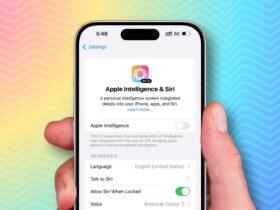Daftar Isi
In a world where digital privacy concerns are mounting, Apple has reaffirmed its commitment to safeguarding user data. The tech giant has clarified that Siri, its virtual assistant, does not send conversations or voice interactions to advertisers. This assurance comes at a critical time when users are increasingly cautious about how their personal information is used.
Apple’s stance on privacy has always been one of its key selling points, and this declaration further solidifies its position as a leader in maintaining user trust. But what does this mean for Siri users, and how does Apple ensure that your conversations remain private?
How Siri Handles User Data
Siri is designed to provide users with a seamless, personalized experience by leveraging artificial intelligence to process voice commands. Whether setting reminders, sending texts, or checking the weather, Siri processes your voice input locally on your device whenever possible.
Apple has implemented several safeguards to ensure privacy, including:
- On-Device Processing: For many tasks, Siri processes data directly on your iPhone or iPad, reducing the need to send data to Apple’s servers.
- Random Identifiers: When Siri does send data to Apple servers to improve functionality, it uses random identifiers instead of linking the data to your Apple ID.
- Limited Data Retention: Voice interactions with Siri are not stored indefinitely. Apple retains data only temporarily to improve the service, and users can delete their Siri history at any time.
Siri’s Role in Apple’s Privacy Commitment

Unlike many competitors, Apple has built its business model around selling hardware and services rather than relying on advertising revenue. This approach allows the company to avoid practices such as monetizing user data for targeted ads.
Apple explicitly states that Siri data is not shared with third parties for advertising purposes. This policy ensures that conversations with Siri remain private and are not used to create advertising profiles.
Addressing Public Concerns About Privacy
In recent years, concerns about digital assistants and how they handle user data have come to the forefront. Some companies have faced backlash for sharing voice data with third-party contractors for analysis, raising questions about user privacy.
Apple has proactively addressed these concerns by taking measures such as:
- Transparency: Apple provides clear explanations of how Siri data is used in its privacy policies and settings.
- User Control: Users can control Siri settings, including disabling Siri if they choose not to use the assistant.
- Opt-Out Options: Apple allows users to opt out of data sharing for Siri analytics, ensuring they have full control over their privacy.
How Apple Stands Out in the Competition
In a competitive market where many tech companies rely on advertising revenue, Apple’s privacy-first approach sets it apart. For example, competitors like Google Assistant and Amazon Alexa may use voice data to enhance ad targeting, whereas Siri’s primary focus is on providing a secure and efficient user experience.
Apple’s use of differential privacy—a technique that anonymizes user data—further underscores its dedication to protecting user information. This ensures that data collected to improve Siri cannot be traced back to individual users.
The Importance of Privacy in Today’s Digital Landscape
The assurance that Siri isn’t sending conversations to advertisers reflects Apple’s broader philosophy on privacy. In an age where voice assistants are becoming integral to daily life, users need to trust that their data is handled responsibly.
Apple’s commitment to privacy resonates with consumers who prioritize security and transparency. This policy also aligns with the company’s branding as a tech innovator that values user trust above all else.
Enhancing Siri While Maintaining Privacy
Despite its strict privacy measures, Apple continues to improve Siri’s capabilities. The assistant has evolved to provide more accurate responses, better contextual understanding, and enhanced integration with Apple’s ecosystem—all without compromising user privacy.
Apple achieves this balance by:
- Using advanced on-device machine learning.
- Collecting only the minimum amount of data necessary for functionality.
- Giving users the ability to manage and delete data associated with Siri.
Final Thoughts: Trusting Siri with Your Privacy
Apple’s assurance that Siri isn’t sending conversations to advertisers highlights the company’s dedication to user privacy. This commitment not only builds trust but also reinforces Apple’s reputation as a leader in digital security.
By prioritizing transparency and user control, Apple ensures that Siri remains a tool for convenience and assistance, free from the concerns of data misuse. In an era where privacy is paramount, Apple’s approach serves as a model for how technology companies can innovate while respecting user trust.






























